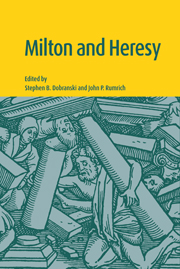Book contents
- Frontmatter
- Contents
- List of contributors
- Acknowledgments
- Abbreviations
- Introduction: Heretical Milton
- PART I HERETICAL THEOLOGY
- PART II HERESY AND CONSEQUENCES
- 4 Milton's Arianism: why it matters
- 5 “Elect above the rest”: theology as self-representation in Milton
- 6 Milton's kisses
- PART III HERESY AND COMMUNITY
- PART IV READERS OF HERESY
- Index
6 - Milton's kisses
Published online by Cambridge University Press: 10 October 2009
- Frontmatter
- Contents
- List of contributors
- Acknowledgments
- Abbreviations
- Introduction: Heretical Milton
- PART I HERETICAL THEOLOGY
- PART II HERESY AND CONSEQUENCES
- 4 Milton's Arianism: why it matters
- 5 “Elect above the rest”: theology as self-representation in Milton
- 6 Milton's kisses
- PART III HERESY AND COMMUNITY
- PART IV READERS OF HERESY
- Index
Summary
This chapter discusses a motif in Paradise Lost that appears first in the context of Eden eroticism, then migrates into the story of the fall of man. The motif bears in a general way on Milton's unorthodox cosmological speculations, particularly on the one Stephen Fallon calls “animate materialism.”
During the twentieth century, the first wave of interest in the heretical aspects of Milton's religious cosmos was prompted by Denis Saurat's Milton, Man and Thinker (1925). Maurice Kelley's This Great Argument: A Study of Milton's De Doctrina Christiana as a Gloss upon Paradise Lost (1941) is largely an argument with the excesses of Saurat, whom Kelley saw as adding to Milton's heresies some even more peculiar ideas of his own about the creation of the world and the nature of the Godhead. For Kelley, as later for the authorial trinity of Bright Essence: Studies in Milton's Theology (1971), Milton's suggestion that the Son of God had a beginning, and so was not coeternal with the Father, constituted much the most disturbing of his heresies. One of the greatest Christian poets had tampered with the center of Christian devotion; this was the heresy to be gotten right, to be placed with utmost care in the history of ideas. Compared to his christology, Milton's conception of matter scarcely counted as heretical.
Saurat, nonetheless, had jumbled everything together, producing base mixtures. Combining Milton's generated Son of God with a literalizing interest in metaphors attached to the creation of the world, including the notion of a matter somehow instinct with God, Saurat had produced a vision of Milton's cosmos sure to frighten and appall his admirers – a kabalistic God of emanations who has some…
- Type
- Chapter
- Information
- Milton and Heresy , pp. 117 - 136Publisher: Cambridge University PressPrint publication year: 1998
- 1
- Cited by



